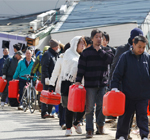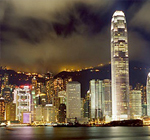
a lesson in humanity
The massive tsunami and earthquake that hit Japan in March this year gave us the frightening images and videos of the effects of the disaster. After the tragedy, ...
More
images . Abby Lim . / text . Pauline Chan .
'Life is like riding a bicycle. To keep your balance you must keep moving.' - Albert Einstein
Richard Ferge and Stani Martinkova plan to keep moving around the world - on their bicycles. A former sommelier and financial coordinator, Richard and Stani have so far covered about 130,000 kilometres and 52 countries since they started their journey in 1996. Between 1996 and 2000, they spent 42 months cycling from Alaska to Argentina, ending the first part of their world domination in Ushuaia in Argentina, the southern most city in the world. They returned to England after that and worked and saved enough money to get on their bicycles again to go further and longer around the globe. In 2004, they said goodbye to England and have been on the road ever since.
image . Abby Lim .
The husband and wife team, also known as the Velomads, have used the online hospitality sites such as Global Freeloaders and CouchSurfing to find friends they can connect with while visiting a particular region. They came to Brunei last week and was hosted by a new found friend they met on Global Freeloaders, Abby Lim. Abby notified the local media who turned out to meet these 2 incredibly intrepid adventurers who have made their tour around the world a way to address the global warming issues impacting our environment now. 
The Velomad's biking and traveling lifestyle allows them to explore new places, meet new people and learn new things. But most of all it allows them to take their concerns about the environment to everyone they meet on their journey. They spend most of their time outdoors. Sometimes they sleep in tents in the wild or wherever they are allowed to and they are close to nature, sharing the living quarters of the creatures that share our earth, and waking up to the sounds and smells of nature. Speaking to locals about the patterns of climate changes and observing first hand the conditions of their surroundings, the Velomads are worried about the health of the earth. They hope, as they ride and clock up the miles, they can raise awareness about climate change by giving presentations in schools, talking to the media and anybody who will listen to them.

Their travel philosophy is simple and green. They are merely passing through the planet and will avoid causing any damage. They aim to 'leave no footprints' or in their case - leave no bike treads. They carry all their possessions with them in bundles of bags strapped to their bikes which includes their stove, oven and cooking utensils. They maintain a healthy but simple diet, choosing to cook most of their meals and buying produce at local markets. They even bake their own bread in their handy portable oven. However, all those years of roughing it out on the road have produced a yearning for little luxuries not within their reach such as good memorable cheese, a comfortable place to sleep and close relationships with people they connect with. When things start to warm up, the Velomads have to pack up and leave. 



images . Stani Martinkova .
Their urge to ride is fueled by their sense of curiosity and desire to experience something new everyday and wake up in a new place every morning. They have had incredible moments to treasure and real-life dramas they will never forget. They have seen the sunrise in the Andes Mountains at 4,955 metres, all alone among the clouds as if the whole mountain belonged to them, but they have also had a gun pointed at their faces when they knocked on a door to ask for directions in Oregon. They have dined with the French Ambassador to Brunei and have been welcomed into people's homes in Kampong Ayer but they have also suffered from dengue fever in Baja California, Mexico and typhoid in Java. The pleasures of traveling are many but the difficulties are not in short supply either. Extreme cold temperatures, icy roads, heavy rain, unceasing snowfall, big trucks and fast cars all make the cyclists' life a little hellish.
According to Stani, cycling fills them with such energy and gives them the desire to keep going, even to dangerous places that they were specifically told not to go. A case in point is the Darien Gap - a large swarth of undeveloped swampland and forest separating Panama and Columbia measuring over 160 kilometres long and about 50 kilometres wide.
In 2003, National Geographic Adventure contributing editor Robert Young Pelton and two American backpackers were kidnapped there and held for 10 days; here is what he had to say (once they got out of there alive):
"The Darien Gap is one of the last — not only unexplored — but one of the last places people really hesitate to venture to... It's also one of the most rugged places. The basic problem of the Darien Gap is that it's one of the toughest hikes there is. It's an absolute pristine jungle but it's got some nasty sections with thorns, wasps, snakes, thieves, criminals, you name it. Everything that's bad for you is in there."
In spite of all the scary bits, the Velomads continue to boldly go forth...
The Velomads have moved on to Sabah. They left on a slow boat from Muara and will be waking up in a new place. They plan to do this for a few more years. Will they settle somewhere eventually? Maybe. But they haven't found the right place yet. Richard gave a clue on where they will probably end up, "We like mountains and lakes."
'If you find a place, you leave it better than the way you found it.'- Richard Ferge and Stani Martinkova
Follow the Velomads on Facebook or Richard's french blog.

a lesson in humanity
The massive tsunami and earthquake that hit Japan in March this year gave us the frightening images and videos of the effects of the disaster. After the tragedy, ...
More

from riches to rags
Hong Kong's hit reality TV show "The Battle of the Poor Rich" has 1.2 million viewers tuning in every week to see wealthy, privileged volunteers give up their luxurious ...
More

saving $1,000 a year on energy bills?
A good tip from the Department of Mechanical and Electrical Services (DME) to help each household save up to $1,000 a year – turn off your appliances left on stand-by ...
More